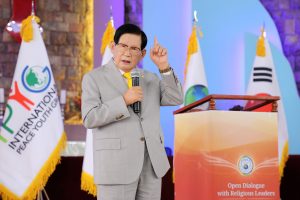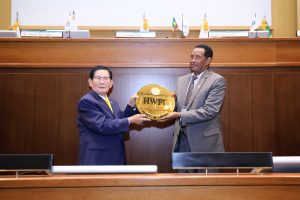Ethiopia Begins the Harmony of Peace through Collaboration of Politics, Education, Religion and Civil Society
Political and social representatives in Africa and Middle East were gathered to discuss international cooperation for peacebuilding through a series of events held in Addis Ababa, Ethiopia including the “Ethiopia Peace Conference” on August 15 with education experts and civil society, the “Addis Ababa Summit” with political leaders from Africa and the Middle East and the “Open Dialogue with Religious Leaders” on August 16.
On August 15, government, educator and youth sought a way to reconciliation for peace at the ‘Ethiopia Peace Conference’ held in the United Nations Economic Commission for Africa (UN ECA) located in Addis Ababa, Ethiopia. At this event, attended by former President of Ethiopia Negasso Gidada, representatives of 10 universities, state minister of education and 700 university students, the DPCW Advocacy Signing Ceremony was held to invent cooperative peacebuilding with the participation of people from every field of society.
Mrs. Dagmawit Moges, Deputy Mayor of Addis Ababa’s municipal government who addressed a speech saying ” Addis Ababa city administration has a deep conviction that the launching of peace education in the Universities could help promote harmony among students regardless of their nationalities, cultural background and religions.” at the event, emphasize about the necessity of peace education and also says that the City Administration pledges to extend every support necessary to institutions engaged in the implementation of this peace education project. In addition, the eleven university presidents and representatives who attended the event laid the foundation for peace education in Ethiopia by signing an MOU to agree on peace education at their universities.




The Chairman of the Heavenly Culture, World Peace, Restoration of Light(HWPL) who visited Ethiopia following a peace tour to the United Nations in May, says “We should also write a letter to the president to support the Implementation of international laws for the cessation of war. It says that the people have all the power of the state. That’s why the president has no reason to refuse what the people want.”. And the Chairman presented a role of civil society for peace and urged them to join peace activities.
In the ‘Open Dialogue with Religious Leaders’, “No religion teaches fighting or killing each other. In order to resolve the religious conflicts, we all must know the Scriptures, and I hope that we can show first from the Ethiopian Protestant Church by Open Dialogue with Religious Leaders.”
In addition, about 50 pastors who participated in a pre-seminar and signed the Pledge for the Regular Operation of Open Dialogue in Ethiopia had time to deliver it to Mr. Lee, Chairman of HWPL. They signed that religious leaders should lead in creating a peaceful environment through holding a regular event for different religious groups starting December this year.
At the “Addis Ababa Summit” held in Medium CR, African Union Commission and co-hosted by international organizations including, Inter-African Committee on Traditional Practices(IAC), International Law Association(ILA) Egyptian Branch and HWPL, politicians from Africa and the Middle East discussed the need for the international law for peace to bring out stability in the regions and promote peace-related projects at each continental level.
RT. Hon. Rebecca A. Kadaga, Speaker of the Parliament of Uganda stressed the role of political leaders for realization of peace. “DPCW draws upon the principles of peace expressed through the ages through which the people of the world expressed their desire for global peace and called upon world leaders to put aside their vested interests that stand in the way of world peace and harmony. ”
With this, prominent leaders had the time to sign on the Signature in Support of the Declaration of Peace and Cessation of War(DPCW).
Before these events in Ethiopia, official declaration of support for the DPCW by heads of African countries such as Eswatini and Republic of Seychelles was followed.
The DPCW deals with the international cooperation to institutionalize and culturally develop peace and cessation of war through the cooperation of world legal experts by HWPL. In this Declaration of Peace and Cessation of War covers the develop friendly relations between nations, prohibit the use of the forces, respect of the international law, foster religious freedom, and spread a culture of peace.
Over 15th to 16th days, HWPL had the time to sign for the support of DPCW with participants from all walks of life. DPCW was created by international law experts for building the peace world without the war. During the two-day peace tour, participants at each event pledged to support and urge the DPCW for sustainable peace.
The Chairman Lee of HWPL, who held the summit with Ethiopian leaders during the 29th Peace Tour, emphasized the importance of peace movement to work as one in which each stratum came together, saying “If there is an answer to peace, then any family of the global village born in this era should become a messenger of peace, ending war and making sustainable peace a legacy for future generations..”
